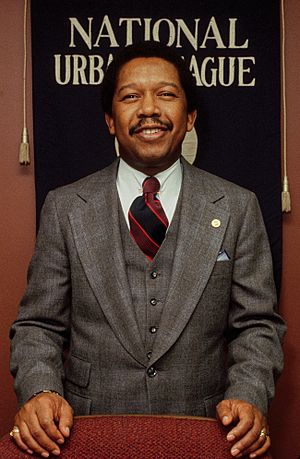John Edward Jacob facts for kids
John Edward Jacob (born in 1934) is an American leader who has fought for the rights of all people, especially African Americans. This is known as being a civil rights leader. He is best known for being the president of the National Urban League from 1982 to 1994. The Urban League is an organization that works to help African Americans and other minorities find jobs and live in better communities.
Jacob was born in Trout, Louisiana. He went to college at Howard University, where he earned two degrees. Before joining the Urban League, he worked as a social worker in Baltimore, helping people in his community.
Contents
A Career Helping Others
In 1965, Jacob started working for the Urban League in Washington, D.C.. There, he ran programs to help young people get a good education. He later moved to California and became the leader of the San Diego Urban League.
By 1979, he was the executive vice-president of the entire National Urban League. He worked closely with the president at the time, Vernon Jordan. When Jordan left in 1982, Jacob became the new president.
Fighting for Fairness
As president of the Urban League, Jacob faced many challenges. During the 1980s, the U.S. government, led by President Ronald Reagan, wanted to spend less money on social programs. These were programs that helped people with things like housing, food, and job training. Jacob argued that these cuts would hurt poor communities.
He also spoke out when he felt the government was not doing enough to protect people's civil rights. He was concerned when new members were appointed to a government group called the Civil Rights Commission. Jacob felt these new members did not support strong actions to protect the rights of all citizens. He also disagreed with government actions against affirmative action, which are policies designed to give opportunities to groups who have faced unfair treatment in the past.
The Urban Marshall Plan
One of Jacob's biggest ideas was a plan to help rebuild America's cities. He called it the "Urban Marshall Plan." This was named after the Marshall Plan, a U.S. program that helped rebuild countries in Europe after World War II.
What Was the Plan?
Jacob's plan had several important parts:
- He asked private companies to help create job training programs for people entering the workforce.
- He wanted the Urban League to use its own money to directly help poor families, both minority and white, with housing and finding jobs.
- He suggested the government create more jobs through public projects, like building roads and schools.
Jacob also believed in "self-help," meaning that communities should also work to help themselves. He started programs to help students prepare for college tests like the SAT. He also created programs that encouraged young men to be responsible fathers and helped young people make smart choices for their future.
Working with Different Presidents
When George H. W. Bush became president, he was at first interested in Jacob's Urban Marshall Plan. Jacob was hopeful they could work together. However, their relationship changed when President Bush vetoed, or blocked, the Civil Rights Act of 1990. This was a law that Jacob and the Urban League strongly supported.
Throughout his time as a leader, John Edward Jacob worked to create more opportunities for people and to make sure everyone was treated fairly.
External links
- Encyclopedia of World Biography
 | Claudette Colvin |
 | Myrlie Evers-Williams |
 | Alberta Odell Jones |


